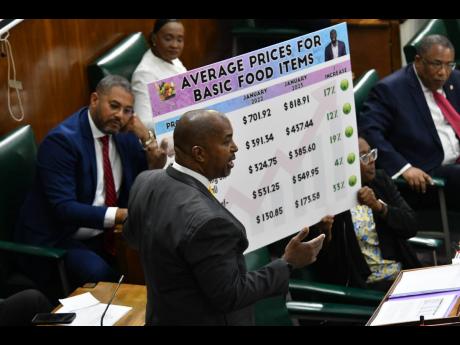Robinson calls for increase in PATH benefits
Opposition spokesman says allocations can’t cover basic food costs
Opposition Spokesman on Finance Julian Robinson has urged the Government to revise the $580 weekly payment to beneficiaries under the Programme of Advancement Through Health and Education (PATH), which he says can barely fund the nutritional needs of a person for a day.
A 2020 study by University of Technology professor Fitzroy Henry showed that it cost US$3.29, or approximately J$490 a day at the time, to meet a low-cost nutritionally balanced diet for a single person
The Ministry of Finance and the Public Service has allocated $16.1 billion for PATH beneficiaries in the 2023-2024 Budget.
Approximately 55 per cent of that amount has been earmarked for conditional cash transfers, while the remainder has been tabled for the breakfast and cooked lunch programme.
Robinson said that of the $16.1 billion set aside, $8.37 billion will go to the conditional cash transfer component of the programme, which targets 275,956 people.
This works out to be an average of $30,000 per year or $580 a week.
“We have already established that a person needs about $600 per day to meet very basic dietary needs. Five hundred and eighty dollars per week can’t even pay for a low-cost, nutritionally balanced diet for one person for one day a week,” Robinson said.
He said that the overall budget for PATH represents about 0.55 per cent of the gross domestic product (GDP) projected for 2023-2024.
“This Government projects that it will fall to 0.49 per cent of GDP by 2026-2027. These numbers have us thinking … the amounts allocated for the most vulnerable are woefully inadequate,” he maintained.
In his contribution to the Budget Debate on Thursday, Robinson argued that while the overall sum for PATH may sound impressive to some, the amounts dedicated to this social programme have not kept pace with inflation.
“If we achieve the five per cent inflation target for this upcoming fiscal year, then $1.40 spent this year will be able to buy what $1 could afford in financial year 2017-2018,” he said.
Robinson shared with his parliamentary colleagues that some students who receive PATH benefits are “shamed” when they seek to access the breakfast and cooked lunch programme at schools.
“I encourage the minister to investigate these issues because their existence suggests that the allocation to PATH and the operation of the programme need to be reviewed,” he said.
Pushing for the Government to move towards calculating a liveable wage, Robinson said that this should be rooted in analysis of annual price movements, the inflation rate, and a determination of the basket of goods and services consumed by the lowest earners.
“This analysis should be done periodically to protect the most vulnerable workers against the ravages of inflation and should include consultation with employers, workers, economists, and other social scientists,” he told the House.
As the Government prepares to announce an increase in the national minimum wage next month, the opposition spokesman said he hopes the labour minister will bump up the sum from the current $9,000 to an amount that can help low-wage earners.
He said that the minimum wage sets the standard for wages across the board, noting that tourism, construction, and government employees are impacted as well as household helpers and security guards.
Robinson expressed alarm and disappointment that despite the Government’s announcement of an increase in the minimum wage early last year, some public bodies are yet to make the adjustment in paying companies offering cleaning and security services.
“These agencies have told their service providers that they are awaiting a decision from Cabinet. The Government must lead by example in this regard and ensure that the minimum wage approved in 2022 is being implemented in all government ministries, agencies, and departments,” he added.

